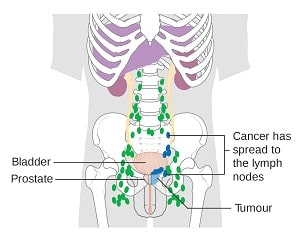
Prostate cancer is cancer that develops in the prostate gland. The prostate gland is a small, walnut-shaped gland in men that is located below the bladder and in front of the rectum. The role of the prostate gland is to produce seminal fluid, the liquid for nourishment and transportation of sperms.
It is one of the most common cancers that occur in men. Generally, the cancer of the prostate grows slowly and initially remains confined only to the prostate gland. The types of prostate cancers develop slowly and may not cause symptoms for years or ever. In such cases, minimal or no treatment are needed. Some prostate cancers are aggressive and can spread quickly.
With increasing age, the prostate in men continues to enlarge over time. This can result in a condition known as benign prostatic hypertrophy or benign prostatic hyperplasia (BPH). in this, the urethra becomes blocked and the urine flow is obstructed by the enlarged prostate tissue. It is a common condition in older men and may cause symptoms that are similar to those of prostate cancer. But it has not been associated with an increased risk of having prostate cancer.
If the prostate cancer is detected at an early stage, i.e. when it’s confined to the prostate gland only, there is a better chance of successful treatment. If the cancer is diagnosed after metastasis and spreads, it is more dangerous and difficult to treat. Prostate cancer most commonly spreads to the bones. Write for us CBD.
Causes of Prostate Cancer
Many types of research are being conducted on this topic, but the causes of prostate cancer are yet unclear.
Prostate cancer begins when some cells in the prostate change become abnormal due to mutation in their genetic material (DNA). These cells can continue to live, while the healthy cells usually die after a time. They can grow uncontrollably and form a mass of abnormal cells known as a tumor. The tumor may be malignant (cancerous) or benign. A malignant tumor is cancerous, which means that it may spread to other parts of the body (metastasis) while a benign tumor only grows in the same location and does not spread to other organs.
The prostate is also responsible for urine control as the urethra,the tube through which sperm and urine exits from the body, also passes through the prostate. The tumor can constrict the urethra and restrict the flow of urine by using tiny muscle fibers.
The prostate gland secretes a protein called prostate-specific antigen (PSA) that helps semen remain in its liquid state. The excess of this protein in the blood is usually one of the first signs of prostate cancer.
PSA levels are evaluated using a blood test. Men with prostate cancer have a higher-than-normal PSA level. Other non-cancerous conditions of the prostate, such as BPH or prostatitis can also cause an increase in the level of PSA.
How does it start?
Cancer in the prostate usually begins in the glandular cells and is known as adenocarcinoma. Small changes start to occur in the shape and size of the prostate cells, known as prostatic intraepithelial neoplasia (PIN). This happens slowly and over time. The symptoms usually do not appear until further progression of the disease.
Almost 50 percent of men over the age of 50 years of experience PIN. A high-grade of PIN is considered pre-cancerous, and it requires further investigation. Low-grade PIN is not a cause for concern.
SYMPTOMS OF PROSTATE CANCER:
Most men with prostate cancer of early prostate don’t have any signs or symptoms. This may be because this cancer grows slowly and is mostly confined to the gland. The early symptoms are only felt when cancer grows near the urethra, the tube through which urine passes, and presses against it. This can cause a range of urinary problems and symptoms. But, usually, the prostate cancer grows in a different part, that is the outer part of the prostate, and therefore, early prostate cancer does not often press on the urethra and cause urinary symptoms.
Typically, the problems with urination, especially in older men, are more likely to be the signs of a non-cancerous condition, Benign prostatic hyperplasia or enlarged prostate.
Anyway, it’s still better to get it checked out by a urologist and be sure about your health.
Some of the possible symptoms of prostate cancer include:
- The trouble with starting to urinate or emptying the bladder
- Weak or slow flow of urine
- Feeling that the bladder hasn’t emptied properly
- dribbling of urine after finishing urination
- Frequent urination, especially at night
- A sudden urge to urinate – urine leaks before reaching the toilet
If prostate cancer spreads out of the prostate (known as locally advanced prostate cancer) or reaches other parts of the body (known as advanced prostate cancer), it can cause symptoms, such as:
- Pain in the back, hip or pelvic
- Issues with getting or keeping an erection
- Presence of blood in the urine or semen
- Weight loss, fatigue, loss of appetite
These symptoms may also be caused due to other health conditions.
You should discuss the symptoms and problems with a urologist so that it can be screened at an early stage only and start with appropriate treatment.
For cancer care, multidisciplinary teams with different types of doctors, including medical oncologists, urologists, surgical oncologist, and radiation oncologists are involved in creating an overall treatment plan. The treatment strategy generally combines different types of treatments options to treat cancer.
Treatment options for prostate cancer:
Cancer Surgery: To remove prostate and surrounding tissues during operation. Types of surgery – radical prostatectomy and robotic or laparoscopic prostatectomy.
Radiation Therapy: The use of high-energy radiation to destroy cancer cells. Types of radiation therapy used for prostate cancer are External beam radiation therapy, Brachytherapy, IMRT, and cyberknife.
Focal therapies: Cryosurgery or cryoablation is used to freeze the cancer cells and stop their growth. High-intensity focused ultrasound (HIFU) is another type of focal therapy in which an ultrasound probe is used to sound waves to cancer cells.
Hormone therapy: Androgen deprivation therapy (ADT) uses male sex hormones called androgens. The lowering of these hormone levels can help slow the growth of cancer.
Chemotherapy: In this cancer treatment, drugs are used to destroy cancer cells. These are either injected intravenously or administered orally in the form of pills.
For more information on Low cost Prostate cancer treatment in India.




